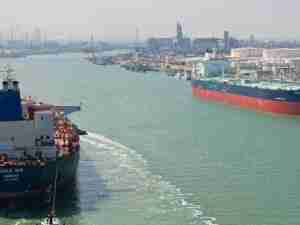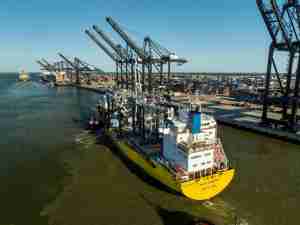US agriculture exports being decimated by port shutdowns
posted by AJOT | Nov 09 2014 at 10:46 PM | Ports & Terminals
The Agriculture Transportation Coalition shows two more examples of severe economic injury caused to U.S. agriculture exporters due to the port shutdowns on the West Coast.
The following comes from a family owned, Washington State fruit export company:
“Is there anything my Washington State congressional representatives or the President (who has said he wants to promote exports) can do to help get my $148,856.50 in Washington State products onto boats that can take them to market?
We have been holding $66,668.00 of product that is supposed to ship in two containers on a carrier and $82,188.50 of product for three containers on another carrier all week. These products all need to make the voyage to South American markets in time for their holidays. If they do not ship we will lose the sales entirely as my customers cannot sell what they do not have and no one gets a second swing at fresh produce, unlike durable goods.
The trucks have been trying to get the empty containers out of the pier since early Monday morning and were told to come back Tuesday. Then on Tuesday they came back and were turned away again. On Wednesday the piers were shut down entirely.
When the ILWU contract with the port operators expired July 1st, everyone agreed to continue negotiating in good faith and resolve differences at the bargaining table. The ILWU has refused to agree to a temporary contract extension as it has in past negotiations because an extension would make everyone subject to the well-established grievance procedures that include jointly-appointed arbitrators who have continually found slowdowns on the waterfront to be impermissible.
Export sales are difficult enough to obtain in this period due to the relatively strong currency rates the dollar is trading at and to fairly high product prices. When we can arrange good sales such as these to paying customers, small businesses like mine are impacted severely.
Thanks for anything you can do.”
Another example from a Washington State potato exporter:
“This is turning into a disaster. We have recently secured new export business in the millions of pounds in Australia and Korea. Additional business gains in Philippines and China are all now at risk. We see our containers backing up at the ports, and, on the heels of harvest completion in the PNW, frozen storage space is at capacity. If we cannot supply as to the Pacific Rim as we have assured over recent months, we will lose volume and confidence of these newly established customers. The PNW will lose its credibility as a region with capacity and capability to assure supply. We will open the door for multiple suppliers, from multiple regions if our ability to assure supply is lost.
Shipping in excess of 17,000 FCL’s off the West Coast annually, we are not only risking trade with our foreign partners, but forcing the shutdown of production facilities in the PNW as we have nowhere to go with our finished goods. Man hours lost for all of our Northwest processing facilities, supporting services, and communities.
This issue has gone on long enough (mid-summer to now). Good faith negotiations should be able to bring this to resolution. Holding the rest of our industry (and economy at large) hostage as bargaining chips is a practice that should not be tolerated. At what point can Taft-Hartley be invoked?
To go for months without resolution and play this card on the threshold of the peak holiday season is clearly leverage which should not be allowed to be used. Our government should step in NOW before they too become victims of the eminent fallout for our industry and all commerce tied to import/export trade; fallout that will take months and millions to rectify if not resolved now.”









